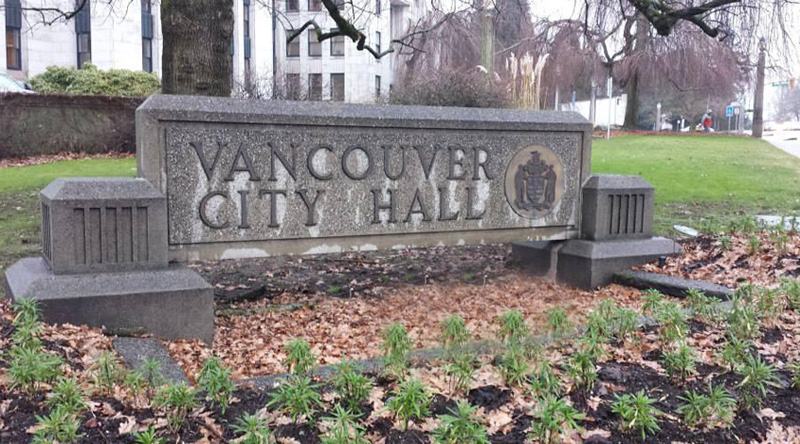
Nov 21, 2022: New Council adopts anti-Semitism definition; pledges to revitalize Chinatown
When roll call was taken at the Nov. 15 Vancouver City Council meeting, many familiar names were heard: Councillors Sarah Kirby-Yung, Lisa Dominato, Rebecca Bligh, Adriane Carr, Pete Fry, Christine Boyle. Six incumbent Councillors were voted back to serve another four-year term, joined by newcomers Brian Montague, Mike Klassen, Pete Meiszner, and Lenny Zhou — giving the ABC Party (Mayor Ken Sim’s A Better City) a “supermajority” on Council.
Former Vision Councillor and development industry lobbyist Raymond Louie welcomed the newly-elected officials to an inaugural ceremony at the Orpheum Theatre on Nov. 7, where Councillors were officially sworn in. They didn’t waste any time getting down to business: by 5 pm that evening they had held their first Council meeting.
Council approves contentious definition of anti-Semitism
Then on Nov. 15, Council wrapped up its meeting in record time, completing business in just over one hour. Speakers to three main motions by ABC Councillors — the adoption of the IHRA definition of anti-Semitism, hiring 100 police officers and 100 mental health workers, and revitalizing Chinatown — were heard the following day on Nov. 16. More than 70 people spoke to the first motion brought forward by Cllr. Kirby-Yung, and it couldn’t have been a more controversial subject. At issue was a motion for the City of Vancouver to adopt the International Holocaust Remembrance Alliance’s (IHRA) working definition of anti-Semitism (IHRA). Council heard from rabbis, representatives from local Jewish organizations, Hillel House, progressive Jewish groups, students, academics, teachers, lawyers, and civil rights activists.
By far, the majority of speakers opposed the motion. Many of them criticized the IHRA description as a threat to free speech with an aim to silence legitimate criticism of Israel, particularly its treatment of Palestinians. Council received an email from the Independent Jewish Voices organization with almost 1,300 signatures opposing the IHRA definition. Others said it would create a chilling effect in academic circles, leaving many in fear of speaking out against Israel.
Council heard from an Oakridge resident who told of her traumatic experience five years ago when she and her family awoke on the last day of Hanukkah to see a giant swastika cut into the snow on their front lawn. The VPD was called and the attending officer, she said, asked for a shovel and destroyed the Nazi symbol while the speaker’s children looked on. “To our shock, she [the officer] told us that if the perpetrators were found they would not be charged because there was no property damage.” If the City had adopted the IHRA definition, she wondered, perhaps the perpetrators would have faced consequences.
Rabbi Dan Moscovitz of Temple Sholom Synagogue said he was traumatized by some of the comments he heard during the meeting. He told Council: These people are telling you that my community’s fears don’t matter.”
Cllr. Kirby-Yung responded that “sometimes there are differences in perspective and opinion. But I think that geopolitical concerns are being conflated with what is an intent to guard against anti-Semitism here in Vancouver — and that’s what I’m concerned with — keeping Vancouver residents who are of Jewish heritage safe here in our city.”
And she warned that racism “is everywhere, so defining it [anti-Semitism] is important. The hate is out there. Everyone can be hit; not just Jews,” she said.
Cllr. Boyle, who voted against the motion, suggested Council adopt a different definition of anti-Semitism such as the one contained in the Jerusalem Declaration, which she said is less controversial than the IHRA definition . Cllr. Fry, who abstained from voting along with Cllr. Carr, said he was “not comfortable” voting on the IHRA definition. “We’ve played into a zero-sum game here,” Fry said, pointing out that Council chambers is not the place for discussion of or decision on such a contentious issue.
Still, the motion passed , with Mayor Sim and Councillors Kirby-Yung, Meiszner, Zhou, Montague, Dominato, and Klassen in favour, and only Boyle in opposition. Councillors Carr and Fry abstained. Cllr. Bligh was absent.
Revitalizing Chinatown
The second motion from Cllr. Kirby-Yung, which proposed that historic Chinatown be supported and revitalized through a variety of urgent measures, passed unanimously.
Several residents spoke of how in addition to struggles with COVID-19, Chinatown has not had the support of the City, and has been allowed to fall into disrepair. Long-standing businesses have closed, and visitors are afraid to frequent the area due to dirty streets— some scattered with needles and feces—racist graffiti, crime, vandalism, and anti-Asian hate.
Carol Lee , Chair of the Vancouver Chinatown Foundation, told Council that consultation with the City has been mostly one-sided. Local groups, she said, have been working together to do what the City should be doing in Chinatown. Council heard from a delegation of representatives from the Chinatown community, and the VPD who flew to San Francisco this year to learn from that city’s revitalization of its own Chinatown. Lorraine Lowe, Executive Director of Dr. Sun Yat-Sen Gardens, who attended the trip, said she witnessed a huge improvement in the neighourbood’s vibrancy and called on all three levels of government to invest in Vancouver’s Chinatown.
Lee suggested the City contribute $1.8 million per year to revitalize the historic neighbourhood. Many who spoke at the meeting were hopeful that the new City satellite office in Chinatown—one of Mayor Sim’s election promises—will be present to oversee the renewal of Chinatown and the Downtown Eastside. For more details, see the above motion.
On Nov. 22, Council will complete discussion and vote on Item 11: Enabling the Requisitioning and Hiring of 100 New Police Officers and 100 Mental Health Nurses, and Item 12: Transport Pricing –- “Stopping the Road Tax.”
In other news:
Kitsilano organizations launch lawsuits
https://www.kitsilanocoalition.org/blog/judicial-review
The Kitsilano Coalition, a group representing residents of the Kitsilano neighbourhood, filed a petition in the Supreme Court of British Columbia last month seeking a judicial review of Vancouver City Council’s approval of the rezoning application for the supportive housing project at 7th-8th Ave. and Arbutus.
The Coalition alleges the City of Vancouver breached the Vancouver Charter by conducting a flawed and procedurally unfair rezoning hearing. CityHallWatch has provided an excellent summary of why the Kits group applied to the Court.
The Kits Point Residents Association is also taking the City to court.On Oct. 5, 2022, the Association filed a petition in the BC Supreme Court challenging the City of Vancouver’s decision to approve the services agreement with the Squamish Nation’s Sen̓áḵw real estate development. You can read more about the reasons leading up to the group’s decision here.



No Comments